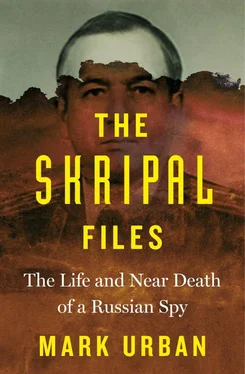For a keen new SIS officer this business of agent recruitment therefore became a challenge, a test of his commitment and skill in just the same way that SAS selection had been. Temperamentally, he was certainly suited to it. A CIA man who observed Bagnall later in his career described him, approvingly, as ‘a most aggressive officer’. And of course for an agency or MI6 type bent on making a name for themselves, the time was ripe. The collapse of Soviet communism had created turmoil and an atmosphere in which many Russians decided it was time to look after Number One.
In the latter part of the Cold War, disenchantment with Soviet ideology had led Oleg Gordievsky, then number two in the KGB’s London rezidentura, to spy for Britain. He had done so knowing that getting caught might well lead to the death penalty, and when betrayed (by an American working for the Russians) he was summoned back to Moscow. Only a daring rescue operation, smuggling him out of the country, had saved his life. Gordievsky, by virtue of his position, had been able to give Britain’s intelligence services a good measure of confidence that there were no significant Soviet moles in their ranks. MI6 furthermore had demonstrated to any Soviet citizen willing to work for them that they could save them, even from execution in Moscow.
With the end of the Cold War, the number of Russian spooks offering to sell their knowledge increased considerably. Following the collapse of the party and Soviet system the KGB itself was broken up. What was formerly its First Chief Directorate (responsible for overseas espionage) became a new service, the SVR. In 1991–1992 all sorts of key SVR people offered themselves to MI6 and the Americans.
In July 1992 the SVR deputy rezident in Paris, Viktor Oshchenko, defected to the UK. He had been stationed in London earlier in his career and was able to reveal the identity of a British mole he had been running at the time. More significantly, during that same year, MI6 arranged the exfiltration of Vasily Mitrokhin from Russia.
Mitrokhin had until the mid-1980s been one of the principal archivists of the First Chief Directorate. Over the course of twenty years he had copied the crown jewels of the KGB’s overseas espionage registry – the codenames of agents in foreign countries, their activities, and access. Thousands of scraps of paper, with these precious facts scrawled upon them, had been hidden by him in milk churns at his country dacha. The archivist had thought hard about how he might convert this extraordinary treasure trove into a retirement plan in the West. Having made an abortive attempt to offer himself to the Americans, he walked into a British embassy in one of the newly independent Baltic states, where a brief conversation took place with an alert British diplomat who told him to come back one month later.
On his second visit to the embassy Mitrokhin was greeted by two members of MI6 who were old Sov Bloc hands able to question the Russian about his offer. Once in possession of the man and his precious (not to say voluminous) notes, SIS had something of extraordinary value: a vivid insight into decades of KGB operations, giving them information of the greatest value to trade with friendly services around the world.
Add to that the SVR defectors who came across to other Western intelligence services, budget cuts back home, and general disaffection following the collapse of the USSR and it becomes apparent why the Western counter-espionage people radiated self-confidence at the time. As for anyone tempted to spy for Russia, Oleg Kalugin, a lugubrious former KGB general who had once run foreign operations, noted, ‘only a very foolish man would work for such a heavily penetrated organization’.
During the early 1990s the UK intelligence services gave journalists quite a few briefings, trying to explain their sense of how the end of the Cold War changed the spying business. I was able to speak both to people who ran MI5’s K or Counter-Espionage Branch and SIS’s Counter-intelligence Directorate. The job of the Security Service, MI5, was essentially to catch foreign agents in Britain, that of MI6 to penetrate hostile intelligence services or bring about the defection of their key players. In keeping with those times of international flux there were reorganizations and changes to the names of some of these sections. As SIS and the electronic eavesdroppers of Government Communications Headquarters (GCHQ) prepared themselves to come into the light, being placed on a proper statutory footing with parliamentary oversight through the 1994 Intelligence Services Act, they were authorized to communicate, up to a point, with the press.
The picture that emerged during these conversations was sometimes triumphalist. ‘We’ve taken them apart, absolutely screwed them,’ an MI6 director told me in 1993. Many saw this as the service’s ultimate revenge for the treachery of Kim Philby and the Cambridge spy ring. The senior MI6 man was a specialist who had been Controller Sov Bloc. He made clear that while he felt the SVR was on the ropes, the GRU was different. We spent some time discussing the Oshchenko defection and the director cautioned me against focusing too much on those who had come over to the West. An operation like the Gordievsky one, daring as it might be, ‘was a sign of failure’ to the professional spy catchers because it established someone’s guilt beyond doubt and would lead to a Russian reassessment of everything and everyone that mole had contact with. ‘The most successful Russian agents’, he said, ‘were those who remained in place for thirty years and have now retired.’
This fascinating insight into SIS’s work was gained just after a press conference at which the service’s chief and the director of GCHQ had for the first time in history opened themselves up to journalists’ questions.
Colin McColl, the chief, acknowledged that the old ‘mega-threat’ was gone and that the agencies were facing ‘a difficult time’. The strength of MI6 was just under two thousand and it was shopping for new missions in order to keep that up. Journalists at the press conference asked about the new oversight arrangements, and tasks such as counter-proliferation (stopping the spread of weapons of mass destruction) and fighting terrorism. There wasn’t much interest expressed in Russia by the press, even though it was clear at the time that the professionals still regarded its intelligence services at the time as posing the biggest challenge to the UK of all the foreign powers.
One day in autumn 1993 I was in MI5’s headquarters in Gower Street. I was to get a briefing with *Jim, who at that time ran K Branch. As we sat chatting in a proverbially nondescript conference room, cups of tea in front of us, he laid out his view of the spying threats to the UK. It was levelheaded – certainly he did not seem in any way nostalgic for the Cold War. Jim noted that there was a 50 per cent drop in the number of SVR officers operating in the UK. Facing budget cuts the SVR had come to a deal with the Foreign Ministry, reducing the number of spooks, and with it the potential for embarrassment with the Western countries that befriended Boris Yeltsin’s democratic government.
The fall of the Berlin Wall had led to some obvious possibilities for economies in the spy business. Western agencies no longer had to track the activities of the KGB’s fraternal Eastern Bloc services, from East Germany to Poland, Hungary, Czechoslovakia, Bulgaria, and Romania. They had become democracies, most dissolving the spying agencies that had become hated symbols of the old system of power. With the collapse of the ideological confrontation there was a host of people also – from the KGB officers in London who liaised with the Communist Party of Great Britain or trades unionists to the staff of MI5’s F Branch who attempted to disrupt them – who were simply out of a job.
Читать дальше












